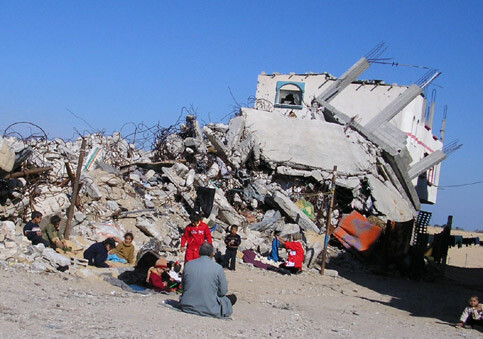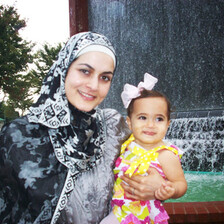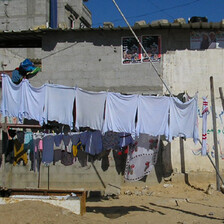Al Jazeera 27 January 2005

Palestinian family sitting next to the rubble of their recently destroyed home in Khan Yunis. (Arjan El Fassed)
Palestinians in the Gaza Strip have cast their ballots in the first municipal elections in decades in this part of the Occupied Territories. Thousands of Palestinians on Thursday turned up at voting booths in 10 districts in the Gaza Strip, including the northern town of Bait Hanun, devastated by Israeli incursions.
The Islamic Resistance Movement, Hamas, which for the first time has candidates running in Gaza, is expected to sweep the elections. Ahmad al-Kurd, director of the Islamic Benevolence Society and Hamas candidate for the district of Dair al-Balah, said he is confident of his party’s success and that the elections will bring change.
“More people have turned up here than for presidential elections: people are incredibly receptive to the idea,” he told Aljazeera.net. “I believe most of them, at least in Dair al-Balah, are voting for [Hamas] ‘Reform and change’ banner, for obvious reasons.”
List of needs
In the northern Gaza Strip village of Bait Hanun, the target of many recent Israeli incursions that have destroyed its infrastructure and uprooted more than 60% of its olive and citrus groves, throngs of Palestinians of all ages could be seen lining up to cast ballots.
One voter, Suad al-Kafarna, said she had a list of needs she hoped would be met by the winning candidates. “We need a good hospital in Bait Hanun. We need sewers, so our children can walk on the streets without getting sick. And we need a solution to the staggering unemployment,” al-Kafarna, who lives in one of Bait Hanun’s most neglected neighborhoods, said.
Amani Shareef, 21, added: “This is a chance that doesn’t come around often for the Palestinian people, and we should take the opportunity to participate in building our nation.”
“What I want, simply, is security, and end to corruption, and a better life for our children. I want our children to feel like other children, to feel what freedom is,” she said.
Voters were optimistic that the new councils would change their living conditions for the better, with corruption and dismal social services topping their lists of concerns.
Hope in change
“I voted for [Hamas] because we haven’t tried them out before. We’ve tried all the others, and they only brought us corruption,” Muhammad Abu Arbeed, 68, said, referring to the municipal councils’ years of domination by the late Yasir Arafat’s Fatah movement.
“Everyone has hope in change, but a great number don’t know where their interests lie. They say they are against corruption, then go right towards those that are involved in it. We are a devastated society, with many people unable to find a loaf of bread to eat. We need change.”
Khalila al-Masri, 80, who with the help of her grandson trudged to the voting centre, said she has lived through too many decades of war and destruction in the Gaza Strip to pass up this opportunity.
“What I want from these elections is to see the good people voted in, not the people who will only bring us more harm and corruption. We want people who can help us move forward, to develop our downtrodden neighbourhoods. And we all know who those people are,” she said.
Without hitch
Usama Abu-Safiya, of the High Commission for Local Elections in Gaza, said the elections were proceeding smoothly.
“The head of the commission, Jamal Shobaki, has been observing the election process in the various districts, with no violations or problems to report so far. The elections are all proceeding extremely well,” he said.
The elections follow a 9 January presidential vote that saw Mahmud Abbas chosen as the head of the Palestinian Authority, and West Bank municipal elections in which Hamas took control of several key villages and towns last month.
In the first in a series of Gaza municipal elections, 414 candidates, including 168 women, are running for 118 municipal council seats. An unofficially tally is expected by midnight Thursday, and official results are to be announced on Friday.
Palestinian parliamentary elections are expected to be held in July.
Laila El-Haddad is a journalist based in the occupied Gaza Strip. This article was originally published by aljazeera.net and reprinted on EI with permission.





